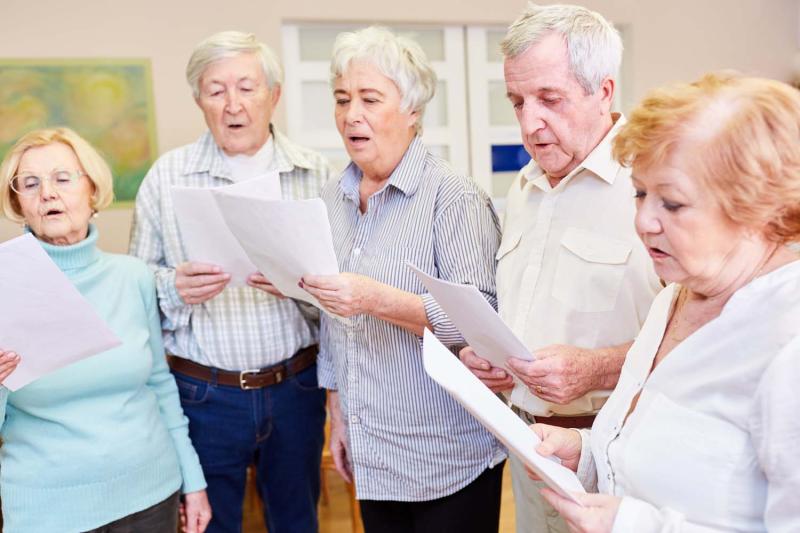Key points
- Arts-based interventions incorporate creative methods of expression through different types of art.
- Evidence from two reviews showed that different forms of arts-based interventions can have a positive impact on responsive behaviours, depression, agitation, wellbeing, self-esteem, and cognitive performance for people living with dementia.
Arts-based interventions (including creative arts therapies) incorporate creative methods of expression through different types of art forms. Creative arts might involve activities such as drawing/painting, drama, music, or dance. Some arts-based interventions include guidance from a trained art therapist (this is known as art therapy). The aim of arts-based interventions for people living with dementia is to increase social interaction and communication and reduce feelings of isolation and depression.
This evidence theme on arts-based interventions is a summary of one of the key topics identified by a scoping review of dementia research. If you need more information on this topic, try using the PubMed search below.
We found two systematic reviews examining the relationship between arts-based interventions and outcomes for people living with dementia. Music-based interventions are the most common form of arts-based intervention and there is good evidence that they benefit people living with dementia. [1]
Music interventions have been associated with:
- A decrease in responsive behaviours (although this change was often not sustained over time) [1]
- A decrease in apathy [2]
- Improvements in clinical measures (such as dementia severity, agitation, or depression). [1]
For a more comprehensive overview of music-based interventions for people living with dementia, please click here.
Visual art, including drawing and painting, is also a common approach. [1] Visual art interventions have been associated with increased:
- Wellbeing [1]
- Sustained attention [1]
- Self-esteem [1]
- Pleasure. [1]
Dance-based interventions were also associated with positive outcomes for people living with dementia. Dance-based interventions have been associated with:
- Decreased agitation [1]
- Improved cognitive performance [1]
- Improved ability to manage one’s own self-care. [1]
For a more comprehensive overview of dance and dance-based interventions, please click here.
From our search, there was only one systematic review found that focused exclusively on arts-based interventions. [1] In addition, this review only focused on dementia of the Alzheimer’s type. [1] Therefore, conclusions drawn from this review should be interpreted with caution. Furthermore, the review highlighted some concerns regarding how these studies were conducted, such as:
- Studies often did not include people living with mild dementia. [1]
- Studies were mostly conducted in residential settings, so it is not clear how beneficial arts-based interventions may be for people living in the community. [1]
- Studies were often unclear about the type, frequency, and duration of the arts-based activity. [1]
- Potentially important outcomes were not assessed (e.g., what the person with dementia felt about the activity and how it improved quality of life). [1]
- Provide opportunities for people living with dementia to engage in a variety of art forms to the extent to which they are able.
- Consider that people who were actively involved in the arts when they were younger may not wish to participate if they cannot do so to the same level.
- Keep in mind that arts-based interventions may not be for everyone.
- Create a safe and facilitating environment for people to engage in creative arts.
- Consider purchasing an organisational licence to Artful: Art and Dementia toolkit (Museum of Contemporary Art Australia). This is a fee-based online resource for people living with dementia and their support network.
- Create opportunities for staff and visiting family and friends to join in creative activities.
- Equip and support volunteers to facilitate arts-based activities under the guidance of lifestyle coordinators or an art therapist.
- Partner with arts organisations to bring arts initiatives to residents. This might include an artist in residence program or an art exhibition. Explore if there are local or state government grants available for this purpose.
- Beard RL. Art therapies and dementia care: A systematic review. Dementia. 2012;11(5):633-56.
- Goris ED, Ansel KN, Schutte DL. Quantitative systematic review of the effects of non-pharmacological interventions on reducing apathy in persons with dementia. J Adv Nurs. 2016;72(11):2612-28.
Connect to PubMed evidence
This PubMed topic search is limited to home care and residential aged care settings. You can choose to view all citations or citations to articles available free of charge.

